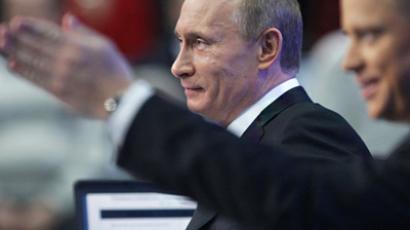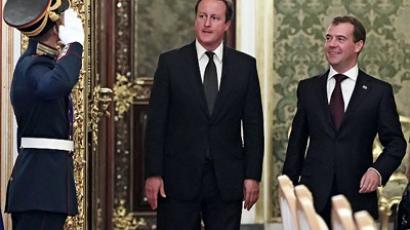‘Kremlin death squads’ spook UK
The British media has placed the blame for the 2006 killing of Aleksandr Litvinenko in London squarely on the shoulders of Russia’s government, and says the Kremlin has special death squads to dispose of its enemies abroad.
As the case of Litvinenko’s death from polonium poisoning approaches hearings next week, the British media has reiterated allegations that the killing was ordered by the Kremlin.The Sunday Times published an interview with the former British Director of Public Prosecutions, Ken Macdonald, who investigated the death. He was the first British official to publicly accuse Russia of planning and committing the crime, which he dubbed a state-ordered execution.Russia’s embassy in London challenged The Sunday Times to provide evidence of their allegations. “We are sure that such evidence has never existed. Otherwise, it would have been presented to us,” Press Secretary Konstantin Shlykov declared on the embassy’s official website. “The author tries to create an impression that the Russian state supposedly covers up Mr. Lugovoy. But this is not true,” added Shlykov. “If British investigating authorities have sound proof of Lugovoy’s guilt, then Russian law enforcement bodies are ready to examine those.”Meanwhile, The Daily Telegraph says it has acquired a copy of a top-secret order which authorizes training by Russia’s Federal Security Service (FSB) of death squads which would operate in former Soviet states and in Europe.
The death of Litvinenko in London in 2006 resulted in a years-long freeze in relations between UK and Russia. British investigators believe that the crime was committed by Andrey Lugovoy, a Russian citizen. They demanded his extradition for trial in London, which Moscow refused because the Russian constitution explicitly forbids such a move.Moscow suggested that a trial of Lugovoy be held in Russia, with the British prosecutors presenting their evidence. London refused the offer. The two countries have cut counter-terrorism cooperation and suffered a number of setbacks in their relations over the ongoing dispute.
The agents would carry out "observation, identification, possible return to the Russian Federation" of their targets and "under special directives" the "elimination outside of the Russian Federation… of the leaders of unlawful terrorist groups and organizations, extremist formations and associations of individuals who have left Russia illegally [and are] wanted by federal law enforcement," the newspaper cites the document as saying.No official comment has been made on the latest publication, but Russian bloggers were quick to point out that the document is most likely a fake. It has various errors, from typos and wrong formatting to the mention of a counter-intelligence department created in 2004, in a document dated 2003.In addition to Aleksandr Litvinenko, the newspaper lists the self-exiled oligarch Boris Berezovsky as well as Chechen militant leaders hiding abroad as potential targets of the FSB. It also cites amendments to Russian counter-terrorism legislation issued in July 2006, which gave the Russian president the authority to order the execution of terrorists and others guilty of serious crimes against Russian citizens.
Seek and destroy
The amendment was approved by the Russian parliament in great haste amid an embarrassing public scandal. On June 3, 2006 Iraqi militants attacked a Russian diplomatic car in Baghdad. One employee of the embassy was gunned down on the spot while four others were kidnapped. The Al-Qaeda-linked militants later killed their hostages.Then-President Vladimir Putin made a statement to the public ordering Russian special services to search for the criminals and eliminate them. Russia also offered a $10 million bounty.
Putin’s order, however, was found to be unlawful. Amendments to the law have been pushed through parliament to change the situation.In the intervening period, two of the people behind the attack on the Russian diplomats have been reported killed. One of them was arrested, tried and executed by the Iraqi authorities, while the other was killed in a US military operation.
‘No need to kill traitors’
The Soviet predecessor of the FSB, the KGB, is known for having carried out political assassinations. One famous case was the 1940 killing in Mexico of Lev Trotsky by Soviet agent Ramon Mercader who killed the exiled Bolshevik leader with an ice pick. Another was Bulgarian dissident writer Georgi Markov, who was killed in London in 1978 with a poisoned umbrella by a KGB agent at the request of Bulgaria’s Soviet government.
Russia’s modern history has been marred by the assassination of the Chechen militant leader Zelimkhan Yandarbiyev, who was killed in Qatar in 2004. Two employees of the Russian embassy in Doha were arrested and sentenced to life for the crime, with some media outlets reporting that they were military intelligence agents. Both were later extradited to Russia, although Moscow never officially admitted being behind the killing.The latest crime linked by the media to Russian interests is the killing of three suspected former Chechen militants in Istanbul on September 16. The investigation into the incident is still underway.Fears that the Kremlin may send assassins to the United States arose after the exposure of 11 Foreign Intelligence Service agents in 2010. Prime Minister Putin, commenting on the concerns in a public Q&A session, said Russia does not send assassins to foreign nations.“In Stalin’s time we had units of the secret service which carried out such missions if necessary. Such units have long been abolished,” he assured.
License to kill
Several politically-motivated killings have been carried out by government agents recently.In May, the United States sent its commandos to Pakistan to kill Osama bin Laden. The assassination was presented as a major accomplishment of the Obama administration and praised worldwide.
In January, the leader of the radical Palestinian party Hamas, Mahmoud al-Mabhouh, was killed in a Dubai hotel. An investigation pointed the finger of suspicion at Mossad agents, although Israel never admitted responsibility. Anwar al-Awlaki, a US citizen and Al-Qaeda leader who had been dubbed “Terrorist No 1” by the US even before the killing of bin Laden, was killed in Yemen by a drone air strike on September 30.














